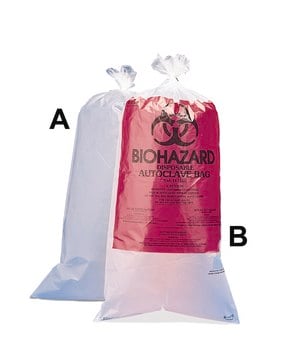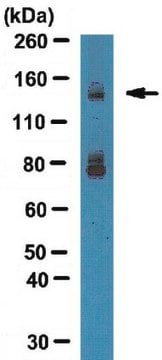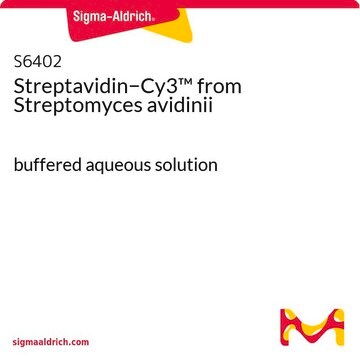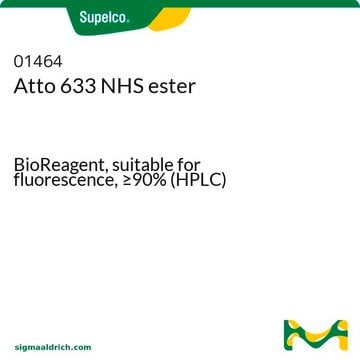79189
Abberior® FLIP 565, NHS ester
for single-molecule switching microscopy (e.g. PALM, STORM, GSDIM)
Iniciar sesiónpara Ver la Fijación de precios por contrato y de la organización
About This Item
UNSPSC Code:
12352200
Productos recomendados
Quality Level
form
solid
concentration
≥60.0% (degree of coupling)
solubility
DMF: 1 mg/mL, clear
fluorescence
λem 580 nm±5 nm in PBS, pH 7.4
storage temp.
−20°C
General description
Absorption Maximum (off-state) λmax:314 nm (PBS, pH 7.4)
Extinction Coefficient, ε(λmax): 47,000 M-1cm-1 (MeOH)
Fluorescence Maximum, λfl:580 nm (PBS, pH 7.4)
Photoactication Wavelength: 310-380 (one-photon activation)
650-800 (two-photon activation)
Fluorescence Quantum Yield, η: 0.38 (PBS, pH 7.4)
Extinction Coefficient, ε(λmax): 47,000 M-1cm-1 (MeOH)
Fluorescence Maximum, λfl:580 nm (PBS, pH 7.4)
Photoactication Wavelength: 310-380 (one-photon activation)
650-800 (two-photon activation)
Fluorescence Quantum Yield, η: 0.38 (PBS, pH 7.4)
Application
Abberior® FLIP 565 conjugated with secondary antibody has been used for STORM (stochastic optical reconstruction microscopy) imaging of COS-7 and S180 cells.
Suitability
Designed and tested for fluorescent super-resolution microscopy
Other Notes
Legal Information
abberior is a registered trademark of Abberior GmbH
related product
Referencia del producto
Descripción
Precios
Storage Class
13 - Non Combustible Solids
wgk_germany
WGK 3
flash_point_f
Not applicable
flash_point_c
Not applicable
Certificados de análisis (COA)
Busque Certificados de análisis (COA) introduciendo el número de lote del producto. Los números de lote se encuentran en la etiqueta del producto después de las palabras «Lot» o «Batch»
¿Ya tiene este producto?
Encuentre la documentación para los productos que ha comprado recientemente en la Biblioteca de documentos.
Remi Galland et al.
Nature methods, 12(7), 641-644 (2015-05-12)
Single-objective selective-plane illumination microscopy (soSPIM) is achieved with micromirrored cavities combined with a laser beam-steering unit installed on a standard inverted microscope. The illumination and detection are done through the same objective. soSPIM can be used with standard sample preparations
Marcus Dyba et al.
Nature biotechnology, 21(11), 1303-1304 (2003-10-21)
We report immunofluorescence imaging with a spatial resolution well beyond the diffraction limit. An axial resolution of approximately 50 nm, corresponding to 1/16 of the irradiation wavelength of 793 nm, is achieved by stimulated emission depletion through opposing lenses. We
Nicolas Olivier et al.
Biomedical optics express, 4(6), 885-899 (2013-06-14)
3D STORM is one of the leading methods for super-resolution imaging, with resolution down to 10 nm in the lateral direction, and 30-50 nm in the axial direction. However, there is one important requirement to perform this type of imaging:
Tim Grotjohann et al.
Nature, 478(7368), 204-208 (2011-09-13)
Lens-based optical microscopy failed to discern fluorescent features closer than 200 nm for decades, but the recent breaking of the diffraction resolution barrier by sequentially switching the fluorescence capability of adjacent features on and off is making nanoscale imaging routine. Reported
T A Klar et al.
Optics letters, 24(14), 954-956 (2007-12-13)
We overcame the resolution limit of scanning far-field fluorescence microscopy by disabling the fluorescence from the outer part of the focal spot. Whereas a near-UV pulse generates a diffraction-limited distribution of excited molecules, a spatially offset pulse quenches the excited
Nuestro equipo de científicos tiene experiencia en todas las áreas de investigación: Ciencias de la vida, Ciencia de los materiales, Síntesis química, Cromatografía, Analítica y muchas otras.
Póngase en contacto con el Servicio técnico





